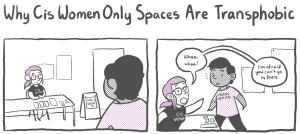W. KAMAU BELL: I’ve been living in New York for a few months now, and I’ve noticed that there’s a lot more cat-calling and street harassment here than in San Francisco, so I took to the streets to ask people what’s really going on. Take a look. We’re here talking to people in New York about cat-calling and street harassment.
SPEAKER 1: The guys are very aggressive. They tend to call at you, like “Hey, sexy mama,” or some of them go as far as saying “Psst, psst, psst,” how you call a cat.
SPEAKER 2: My girlfriend told me that one day she was walking down 8th Avenue and the guy walked up to her and said, “Hey, can I lick your legs?” How does someone respond to that?
W. KAMAU BELL: Probably not “yes.”
SPEAKER 3: “Oh, do you come around here often?” Like, “What do you do?” “Can I meet up with you?” I’m like…
W. KAMAU BELL: He was trying to arrange to stalk you.
SPEAKER 3: Yes.
SPEAKER 4: The first guy who said “Hey, baby” to me, I responded “Hey,” and he responded, “I want to bleep you in your bleep.”
W. KAMAU BELL: I have to admit I’m trying to figure out what bleep was the bleep that he was going to bleep you in the bleep. How often does it happen?
SPEAKER 1: It happens like every day.
W. KAMAU BELL: Every day?
SPEAKER 1: Yes.
W. KAMAU BELL: Every day.
SPEAKER 1: Yes.
SPEAKER 5: Almost every day.
SPEAKER 6: All day, every day.
SPEAKER 3: Every day.
SPEAKER 7: It happens probably daily.
W. KAMAU BELL: Daily?
SPEAKER 7: Daily.
SPEAKER 8: If I were to stop and talk to every guy on the street, I wouldn’t live my life. I couldn’t.
K. KAMAU BELL: You’d only be about 20 feet from your house, it sounds like.
SPEAKER 8: Exactly.
W. KAMAU BELL: Yeah.
SPEAKER 8: It’s a waste of time to have to, in some instances, reroute my whole day.
W. KAMAU BELL: What are your thoughts about street harassment?
SPEAKER 9: I think street harassment is good, you know?
SPEAKER 10: You all, you got cake days, man.
SPEAKER 11: “I seen you from somewhere before.” They’ll be like, “A-ha, a-ha.” They start giggling, they start blushing, hair starts flowing, and the next thing you know, you have them where you want them.
W. KAMAU BELL: We’ve talked to some guys who claimed that it has worked.
SPEAKER 12: In their mind, it works, and then that’s because they forgot to take their Lexapro or something.
SPEAKER 9: I think women need that.
W. KAMAU BELL: Why do they need that?
SPEAKER 9: Makes them feel better about themselves.
W. KAMAU BELL: I think that a lot of women would say that it does not make them better about themselves and, by a lot, I mean 100%. So in all the ways that you rank to pick up a woman, you want to let the men know that that’s the worst way.
SPEAKER 12: Next to kidnapping.
SPEAKER 9: I still feel like it’s a good thing. When I talk to women, they have better days, you know?
W. KAMAU BELL: I like it. A man who’s not swayed by facts. What would you do to stop cat-calling if you could do anything?
SPEAKeR 1: Maybe I would give myself the eye vision, when I just look at a guy, and their mouth is sealed shut. They can’t say it, it’s just ..
W. KAMAU BELL: What would you do to that guy?
SPEAKER 6: Snap my fingers and make him disappear.
W. KAMAU BELL: Just bam!
SPEAKER 7: Some type of powerful electric shock to an area on their body that would just be really painful.
W. KAMAU BELL: So, like, “Hey, baby… Ahhh!”
SPEAKER 7: Yes.
SPEAKER 12: They should be branded.
W. KAMAU BELL: Oh, branded, like a scarlet letter.
SPEAKER 12: Yeah.
W. KAMAU BELL: What are we going to do about these dudes?
SPEAKER 8: You’re a dude. Talk to your dudes.
W. KAMAU BELL: Okay. Alright.
SPEAKER 8: Have these conversations with your boys.
W. KAMAU BELL: Dudes, stop street harassing women. They think it’s creepy. You got that? Creepy. Hey, dudes who are harassing women in the streets, I suggest you try something like Adult Friend Finder. The only person who can start a sentence with “Hey, girl” is Ryan Gosling. If you think cat-calling and street harassment builds up a woman’s confidence, you’re right. It makes them confident that you’re a creep. Ladies, on behalf of all men, I’m sorry. Dudes, if you can’t stop yourself from talking to women in the streets, then here’s some sensible and sensitive alternatives.
SPEAKER 13: I would love to help you accomplish your goals. I gave up on mine a long time ago.
SPEAKER 14: I don’t care if fries come with shake or not. I just want to know if you’ll like my poetry.
SPEAKER 15: I don’t want to die alone.
SPEAKER 16: My braggadocio is over-compensation for my lack of confidence in [inaudible 00:04:18] of my sexual difficulties.
SPEAKER 17: Hey, girl, I hate my job. Hold my hand.
SPEAKER 18: I want to stick my tongue down your mind.




















